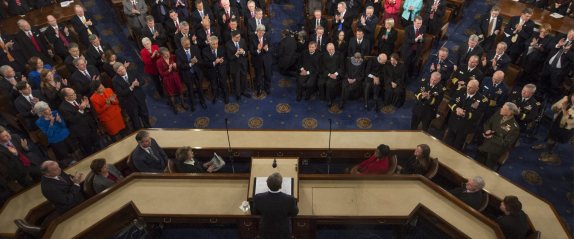
$10.10 per hour — by executive order
If the minimum wage raise Obama intends can be extended to more than just federal contractors, it has the power to lift 5 million people out of poverty
President barack obama in front of both houses of Congress during his most recent State of the Union address on Jan. 28. EFE
Conversation on the train platform the morning after President Obama's State of the Union address Jan. 28:
"Did he talk about raising the minimum wage?" asked one of the 7:23 a.m. train regulars, a 30-year-old man with a developmental disability.
"Yes," answered a woman, "to $10.10."
The man visibly brightened. "That's great," he said. "I make minimum wage. It's only $7.25."
"But the increase is only for federal contractors," the woman hastened to add.
"Oh," the man said, clearly uncertain whether the hoped-for increase would actually impact him.
As silent witnesses to the exchange, we were struck by two things, one almost painfully evident (except to certain politicians) and the other much less so.
First, for those who earn minimum wage, the executive order mandating $10.10 is no trifle. To the man speaking on the train platform, for example, it represented the possibility of earning — in one hour — approximately what it costs him to get to and from work. Right now, he's into his second hour of labor every day before that happens.
Many of those companies that must now pay their workers $10.10 are food, construction and maintenance service providers under federal contracts. A considerable number of them did not, until now, provide a living wage or basic benefits like health care or sick leave for their workers.
The government itself estimates that approximately 20 percent of the U.S. workforce is employed by federal contractors. That's a lot of people lifted out of poverty, though not the whole 4.6 million people who would benefit immediately (nor the 6.8 millionwho would be benefitted in the longer run) from Congressional approval of an unrestricticted federal minimum wage hike.
Florida Senator Marco Rubio, however, was dismissive of the real impact of Obama's executive order. "Raising the minimum wage may poll well, but having a job that pays $10 an hour is not the American Dream," he said.
"The way our people will achieve the American Dream," he continued, "is by making it easier for those who are stuck in low-paying jobs to seize opportunities to move up to better paying jobs. To do this, we must focus on policies that help our economy create those jobs and that help people overcome the obstacles between them and better paying work."
But the private sector, where Rubio thinks those "American Dream jobs" are, has often had to be nudged to provide anything resembling a living wage. Recent revelations about WalMart and McDonald's corporate policy of urging full-time workers to apply for government assistance as a means to compensate for the ultra-low wages come to mind.
Moreover, for workers with disabilities, like the man we overheard this morning, the private sector has been a poor employer — with the notable exception of Walgreens, which has instituted an employment policy to actively recruit and train a good percentage of workers with disabilities.
Employment participation for working age people with disabilities has, overall, remained stagnant for the past two decades (approximately 31 percent of working age people with disabilities are employed), with most opportunities provided through self-employment and the federal government.
Federal contractors, the report says, have never been asked to report on disability incidence within their workforces or applicant pools, so the numbers aren't there to calculate the total impact the $10.10 hike to minimum raise might have for the national disabilities workforce, but the potential is tremendous.
Poor employment prospects, higher than average medical costs, and employment histories that often include exploitive private sector "centers" that pay even less than minimum wage for repetitive jobs with no hope of advancement — all of these have made the reality of being an American worker with a disability about as far from Rubio's fabled American Dream as it is possible to be.
Obama's $10.10 executive order will benefit many workers, but gratifyingly, it appears it may benefit workers with disabilities most of all.









DEJE UN COMENTARIO:
¡Únete a la discusión! Deja un comentario.